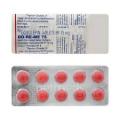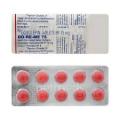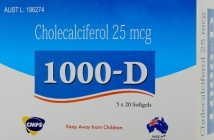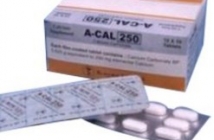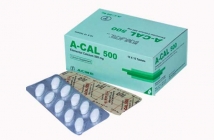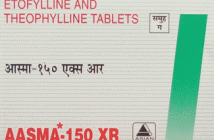Home / Categories / PROTHIADEN-75MG
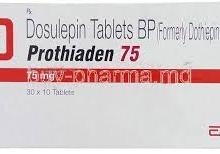
PROTHIADEN-75MG
(10)
DOSULEPIN-75MG
TRICYCLIC ANTIDEPRESSANTS
ABBOTT INDIA LTD.
Product Details
DOSULEPIN
Dosulepin formerly known as dothiepin, is a tricyclic antidepressant with anxiolytic properties that is used.
Indication
Indicated in the treatment of symptoms of depressive illness, especially where an anti-anxiety effect is required.
Pharmacodynamics
Dosulepin is a tricyclic antidepressant that interacts with various receptors and transporters. It is a monoamine reuptake inhibitor with approximately equal potency for noradrenaline and 5-HT that increases the availability of these neurotransmitters at the central synapses. The metabolites of dosulepin are shown to inhibit 5HT uptake by the human blood platelet.
Mechanism of action
By binding to noradrenaline transporter (NAT) and serotonin transporter (SERT) in an equipotent manner and inhibiting the reuptake activity, dosulepin increases the free levels of noradrenaline and 5HT at the synaptic cleft. It is shown that the main metabolite northiaden is a more potent inhibitor of noradrenaline uptake than the parent drug.
Dosulepin displays affinity towards α2-adrenoceptors and to a lesser extent, α1-adrenoceptors. Inhibition of presynaptic α2-adrenoceptors by dosulepin facilitates noradrenaline release and further potentiates the antidepressant effects. It also downregulates central β-adrenoceptors by causing a decline in the number of receptors and reduces noradrenaline-induced cyclic AMP formation. Dosulepin binds to 5HT1A and 5HT2A receptors in the cerebral cortex and hippocampus as an antagonist. 5HT1A receptors are autoreceptors that inhibit 5HT release and 5HT2A receptors are Gi/Go-coupled receptors that reduces dopamine release upon activation. Antagonism at 5HT2A receptors may also improve sleep patterns. Dosulepin also binds to muscarinic acetylcholine receptors and causes antimuscarinic side effects such as dry mouth. By acting as an antagonist at histamine type 1 (H1) receptors, dosulepin mediates a sedative effect.
Main metabolites northiaden, dothiepin sulphoxide and northiaden sulphoxide may also bind to 5HT, α2 and H1 receptors, although with less affinity compared to the parent drug
Absorption
Dosulepin is well absorbed from the intestines to reach the peak plasma concentration of 37.6ng/mL at 2.18 hours (Tmax) following oral administration of 25mg. The steady state concentrations are variable among individuals due to dynamic relationship between the drug dose and plasma concentration.
Volume of distribution
The mean apparent Vd is approximately 45 L/kg after oral administration of 75mg dosulepin. It crosses the blood-brain barrier to mediate its antidepressant actions and also crosses the placental barriers, with low concentration of the drug excreted in breast milk.
Protein binding
Approximately 84% of unchanged drug is bound to serum protein.
Metabolism
Dosulepin undergoes extensive hepatic metabolism, to form main metabolites N-demethylated derivative northiaden (desmethyldosulepin or northiaden) and dosulepin S-oxide. Northiaden S-oxide is among 12 basic metabolites that are found in urine. The metabolic pathways of dosulepin is thought to involve N-demethylation, S-oxidation and glucuronic acid conjugation.
Route of elimination
Dosulepin is predominantly cleared via renal elimination, mainly in the form of metabolites. Renal excretion of dosulepin and its metabolites accounts for 50% - 60% of total elimination, and biliary/fecal excretion is about 15%-40%.
Half life
The elimination half life is approximately 20.4 hours following oral administration of 25mg dosulepin.
Clearance
Oral clearance is approximately 1.36 L/kg * hr following a single oral dose of 75mg dosulepin.
Toxicity
High mortality is associated with overdose of dosulepin (>5mg/kg) with the onset of toxicity occuring within 4-6 hours. Dosulepin may increase the risk of cardiovascular toxicity (cardiac arrhythmias, conduction disorders, cardiac failure and circulatory collapse) and severe hypotension, especially in the elderly [7]. Withdrawal symptoms are reported in case of sudden cessation of therapy, which include insomnia, irritability, headache, nausea, giddiness, panic-anxiety, extreme motor restlessness and excessive perspiration. There have been reports of increased suicidal thoughts or behaviour with dosulepin treatment. Oral lowest published toxic dose (Toxic Dose Low, TDLo) is 90 mg/kg in infants and 4.5 mg/kg in female adults. Intravenous LD50 in mouse is 31 mg/kg .
Most common adverse effects involve the central nervous system (drowsiness, extrapyramidal symptoms, tremor, confusional states, disorientation, dizziness, paraesthesia, alterations to EEG patterns), anticholinergic effects (dry mouth, sweating, urinary retention), cardiovascular system (hypotension, postural hypotension, tachycardia, palpitations, arrhythmias, conduction defects), endocrine system (altered libido), gastrointestinal system (nausea, vomiting, constipation) and blurred vision.
SOURCE: DRUGBANK
Substitutes

